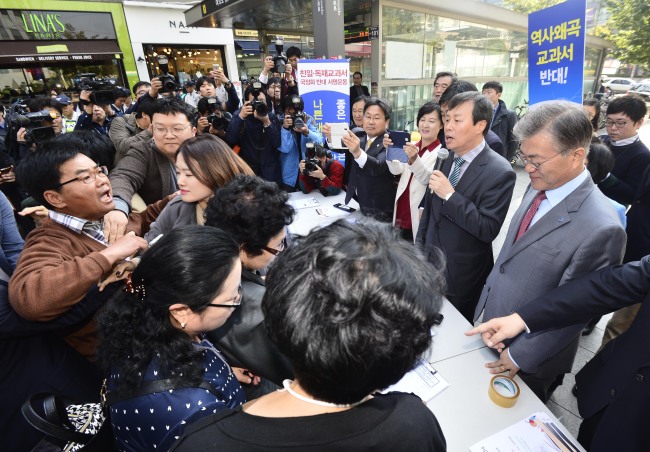The nationwide dispute over the Education Ministry’s recent decision to reinstate state history textbooks for secondary education hinges on the government and the ruling party’s claim that current textbooks are biased in favor of the leftists.
But scholars and the opposition lawmakers have pointed out that most of the points used as evidence of “left-leaning bias” are false, heralding further head-butting over the issue.
 |
| Members of a conservative civic group protest against NPAD chairman Rep. Moon Jae-in (right) and other party members who were holding a rally opposing the government’s revival of state-published history textbooks in Yeouido, Tuesday. (Yonhap) |
Education Minister Hwang Woo-yea along with National Institute of Korean History chief Kim Jung-bae, who will be overseeing the textbook production process, said Monday the rampant distortion in the textbooks by historians’ own viewpoints has forced the government’s hand in taking over publication rights. Currently South Korea allows eight private publishers to author history textbooks and authorizes them if they are up to standards.
The stern warning by the ministry is coupled with an unconfirmed claim by ruling Saenuri Party leader Kim Moo-sung that 90 percent of Korean historians are leftists.
One of the points made by Hwang was that some textbooks, including one from local publisher Mirae-N, claims that both Koreas shared responsibility for the 1950-53 Korean War that was sparked by the North’s invasion on June 25, 1950.
The textbook describes the situation as the two Koreas being involved in frequent minor skirmishes at the border prior to the war. The description also said that South Korea’s first President Rhee Syng-man insisted on South-led unification and anticommunism while the North looked to communize the peninsula, which proponents of the state textbook took as evidence that privately authored textbooks treated the two Koreas the same and equally responsible for the war.
But Rep. Do Jong-hwan of the New Politics Alliance for Democracy claimed the Mirae-N textbook states that North Korea invaded the South, and carries a detailed description of Pyongyang’s battle orders delivered to frontline forces three days before the war.
Another point made by Vice Education Minister Kim Jae-Choon was that one of the textbooks used the word “dictatorship” 24 times to describe South Korean politicians while using the word only twice for the North.
But Cho Han-kyung, the president of the Association of Korean History Teachers, said the disparity comes from the textbooks dedicating a much larger proportion of the content to South Korean politics than politics of the North.
“There has been only one hereditary regime in the North, while Seoul has had several dictatorial administrations,” he said. “The current textbook only describes the history of North Korea in a single subsection.”
Another accusation the ministry threw out was that the textbooks were justifying North Korea’s juche (self-reliance) ideology, which is the foundation of state founder Kim Il-sung’s dictatorship.
But opponents counter that while both textbooks from Kumsung Publishing and Chunjae Education, which have been accused of teaching the juche idea, explain what it is, they also say that it ultimately led to the personal idolization of Kim Il-sung and him monopolizing power. They say the idea was used as an excuse to control the citizens by executing anyone opposing him.
The more pressing matter is that some of the ideas that are expected to be included in the new textbooks can prompt further ideological controversies.
NIKH chief Kim said that the descriptions in the textbooks that say “the Korean government was founded in 1948” are wrong, saying it should instead say “Korea was founded in 1948.” He said that the Provisional Government of the Republic of Korea established in 1919 was by definition, provisional.
Kim’s comments ran counter to Korean constitutional law that the country inherits the tradition of the provisional government. He later backed down and declined to answer exactly when he believed the country was founded.
Further confusions loomed large as ministry officials also showed mixed views on details. While Kim said controversial theories and opinions cannot be written in the textbooks, Vice Minister Kim Jae-choon said a dominant theory can be introduced along with minority opinions, hinting at a long, perilous way for the fledgling, reborn state history textbook.
By Yoon Min-sik
(minsikyoon@heraldcorp.com)

